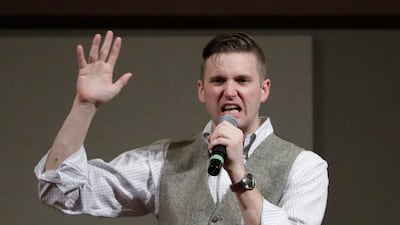The violence at the white nationalist “Unite the Right” rally in Charlottesville in 2017 sent shockwaves across the US, with demonstrators hurling flaming torches and beating up counterdemonstrators, and a self-proclaimed Hitler admirer ramming his car into a crowd, killing a woman and injuring dozens more.
The driver of that car is serving life in prison for murder and hate crimes. More than four years later, a civil trial will determine whether the neo-Nazis and white supremacists who organised the demonstrations should also be held to account.
Jury selection began on Monday for the trial in US District Court in Charlottesville.
The civil lawsuit was funded by Integrity First for America, a non-profit organisation formed in response to the Charlottesville mayhem with the goal of using litigation to disarm the instigators of the violence.
It accuses some of the country’s most well-known white nationalists of orchestrating a “meticulously planned conspiracy” to commit violence against black people, Jewish people and others based on race, ethnicity, religion and sexual orientation.
A firestorm erupted after then-president Donald Trump failed to strongly denounce the white nationalists, saying there were “very fine people on both sides".
Hundreds of white nationalists descended on Charlottesville on August 11 and August 12, 2017, ostensibly to protest city plans to remove a statue of Confederate General Robert E Lee.
The nearly two dozen accused include Jason Kessler, the rally’s main organiser, who terms himself a “white civil rights” leader; Richard Spencer, who coined the term “alt-right” to describe a loosely connected band of white nationalists, neo-Nazis and others; and Christopher Cantwell, a white supremacist who became known as the “crying Nazi” for posting a tearful video when a warrant was issued for his arrest on assault charges for using pepper spray against counterdemonstrators.
The plaintiffs include four people who were hurt when James Alex Fields Jr rammed his car into a crowd of counterdemonstrators.

The case is built on a vast collection of chat room exchanges, social media postings and other communications in which the accused use racial epithets and discuss plans for the demonstrations, including what weapons to bring.
Lawyers for the plaintiffs are relying on a 150-year-old law passed after the Civil War to shield freed slaves from violence and protect their civil rights.
Commonly known as the Ku Klux Klan Act, the law contains a rarely used provision that allows private citizens to sue other citizens for civil rights breaches. To win a judgment, the plaintiffs must prove the accused conspired to commit racially motivated violence and planned it in advance — and that the plaintiffs were injured as a result.
“It’s the only case that really takes on the leadership and organisation of the white supremacist movement,” said Karen Dunn, one of the lead lawyers in the lawsuit.

